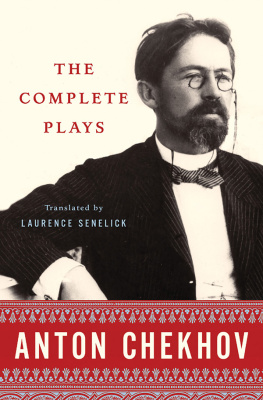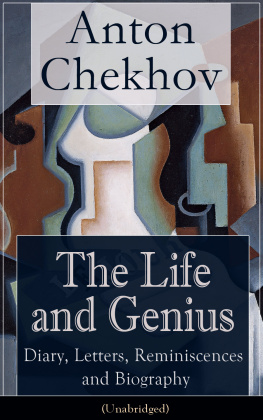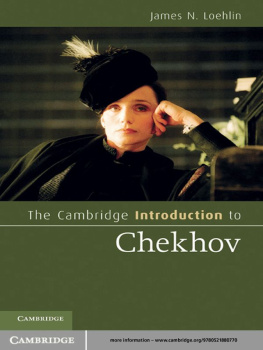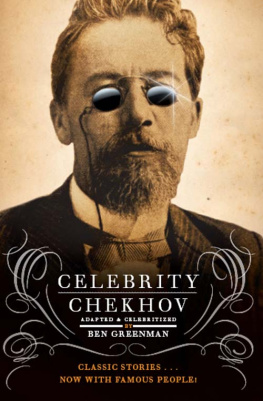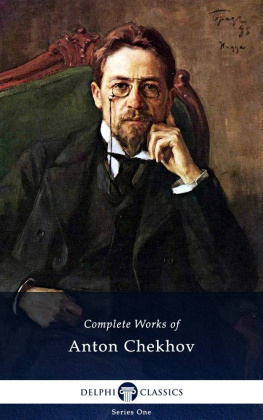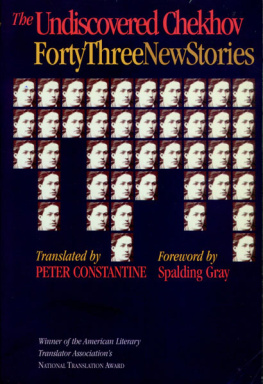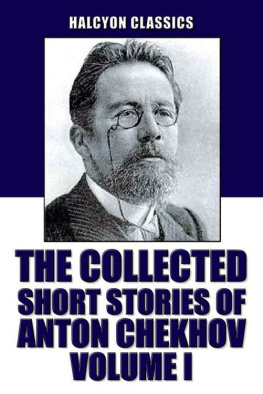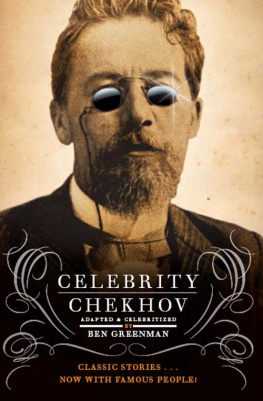CHEKHOV
A BIOGRAPHY

V. S. PRITCHETT

This electronic edition published in 1988 by Bloomsbury Reader
Bloomsbury Reader is a division of Bloomsbury Publishing Plc, 50 Bedford Square, London WC1B 3DP
Copyright V. S. Pritchett, 1988
First published by Hodder and Stoughton 1988
All rights reserved
You may not copy, distribute, transmit, reproduce or otherwise
make available this publication (or any part of it) in any form, or by any means
(including without limitation electronic, digital, optical, mechanical, photocopying,
printing, recording or otherwise), without the prior written permission of the
publisher. Any person who does any unauthorised act in relation to this publication
may be liable to criminal prosecution and civil claims for damages
ISBN: 9781448200924
eISBN: 9781448202249
Visit www.bloomsburyreader.com to find out more about our authors and their books
You will find extracts, author interviews, author events and you can sign up for
newsletters to be the first to hear about our latest releases and special offers
Contents
TO DOROTHY
Introduction

I have been an elated reader of all the great Russian novelists and short-story writers since my early twenties and I have often written about them, though I know no Russian and have never been to Russia. The lure for me (I realize now) lay in John Bayleys wonderful phraseI believe in his learned introduction to Pushkins Lettersthat the doors of the Russian house are wide open: we see people who speak out in the lost hours of the day as it passes through them.
In writing my present biographical and critical study of Chekhov I owe a great debt to the scholarship of others. For Chekhovs stories I have usually followed the remarkable translations of Constance Garnett. They appeared in a haphazard chronology, inaccuracies have been pounced on, but her voice is close to Chekhovs period. I have used her translation of a selection of Chekhovs letters; but I have also turned to the spirited translations done by Avrahm Yarmolinsky and I have learned much from the well-documented translation and extensive notes of Michael Henry Heim and Simon Karlinskys edition. For Chekhovs biography I have relied on Ernest Simmonss solid volume published in 1962 and rather less on David Magarshack, and on the well-informed commentary of Ronald Hingley, translator and editor of The Oxford Chekhov. I have, of course, consulted Prince Mirskys History of Russian Literature and among critics Donald Rayfields illuminating study Chekhov: The Evolution of His Art and its approach to the Symbolists who followed him. I have also read William Gerhardis lively study written in the twenties. Gerhardi, himself a novelist, had the advantage of having spent his childhood in Russia. There is a rich store of Russian reminiscence of Chekhov in Gorkys memoirs of him, also in Bunins conversations and in the memoirs of S. S. Kote-liansky, who contributed, with Leonard Woolf, a piquant selection from Chekhovs Notebooks, published in 1921 by the Hogarth Press. For The Island: A Journey to Sakhalin I have used Luba and Michael Terpaks translation, and for The Shooting Party, translated by A. E. Chamot, I have used the recent edition with its excellent introduction by Julian Symons. Among selections of Chekhovs works I have also consulted Yarmolinskys The Portable Chekhov: The Early Stories 1883-85, translated by Patrick Miles and Harvey Pitcher; also the Early Stories, edited by Nora Gottlieb. For the plays I am indebted to editions by Ronald Hingley and Elisaveta Fen. To all these scholars I owe a great debt.
As a writer and a public-spirited doctor, Chekhov was a restless man, continually working, who refreshed himself by travel. Gregarious though he often was, he was careful to preserve his independence and his puzzling silences. His life story really lies in his work, and his genius, in my opinion, lies above all in his creative gifts as a writer of short stories. I share Ronald Hingleys concern that his supremacy in this genre is nowadays overshadowed by the popularity of his plays with a public that prefers to listen. In fact his plays derive directly from his stories, in which, it seems to me, the texture is far richer. (In the twenties, Prince Mirsky rather coldly said the plays were infectious, indeed nothing but infectious.) It seems to me that in richness of texture and feeling and the contradictions of human experience, Chekhov is more vigorous and wider in range in masterpieces like The Peasants or In the Ravine. No play matches Ward 6 or the leaping imaginative effects of Gusev or the anthemlike The Bishop. For this reason I have examined the stories in detail and have tried to show the growth of his astonishingly various art. Chekhovs stories are, in this sense, his life, tunes that his Russia has put into his head, and are magically sustained.

Anton Chekhov was born on January 17, 1860, in the small seaport of Taganrog, a town just outside what are now the boundaries of the Ukraine, on the Sea of Azov in the south of Russia. In the following year Emperor Alexander II had decreed the abolition of serfdom, and it was a matter of pride in the Chekhov family that their peasant grandfather, who had been the manager of the sugar-beet mill and eventually the steward of a large estate in the province of Voronezh, had saved enough money to buy the freedom of his family twenty years before. He had shrewdly educated his sons and put them into trade. Pavel, Chekhovs father, became a bookkeeper in a merchants office in the larger port of Rostov-on-Don. There, by hard work, he was able at last to marry and to open a general store in Taganrog. His young wife was the daughter of a merchant in the textile trade. Anton was their third son. A daughter and two more sons followed.
With the great difference that Russia was scarcely yet an industrial country and indeed had hardly moved out of its medieval condition, Pavel had much in common with the classic self-made Victorian puritan. He was a fierce believer in Self-Help and the work ethic, a despot in the family, shouting his wife down, ruling his sons by beating them, sayingwhen his wife protestedthat the same had been done to him and that it had made a man of him. Pavel, the slave turned master, was a tall, almost handsome figure with a grizzled beard and a glare in his eyes, a man not to be argued with. All heads were lowered at mealtimes as he hectored the family on their duties. On the wall of the living room was a timetable of the childrens tasks, hour by hour, during the day. There were to be no idle minutes, there was to be no playing in the streets. At an early age the children had their duties in the shop. It was open from five in the morning until midnight.
Like the majority of the houses in the poorer parts of the town, the Chekhovs house had a single story and a tin roof; the store was attached to the house. There was no sanitation: the family had to go to common bogs in a field at the back. For washing there was the communal bathhouse in the town. Where did the family sleep? Behind screens in the living room. Chekhov often slept in a shed where his father kept his lifetime store of newspapers. When the boys started school they had to sit at the counter of the shop, doing their homework, and keeping an eye on the wretched, ill-paid apprentices, who had been trained in the art of short weight and were inclined to steal. In later life when Chekhov was famous he paid for the education of the daughter of one of these lads.


